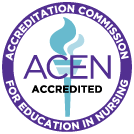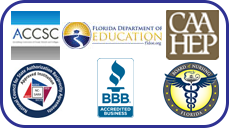Why earn an Associate of Science Degree in Nursing?
Registered Nurses are prepared to practice as providers and managers of care, participate as members of the healthcare community and assist patients and families in meeting physical, psychological, social, and spiritual needs. Registered Nurses provide evidence-based, culturally competent care in a variety of settings.
They integrate knowledge of general education and the sciences into their practice and use of technology to provide quality professional nursing care. Registered Nurses use concepts of preventative care and community resources to teach patients to become involved in decisions about their own healthcare.
The Associate of Science in Nursing degree at the International College of Health Sciences
The nursing program is designed as a hybrid program providing both synchronous and asynchronous online learning, in person lab and in-residence clinical experiences.
The Associate of Science in Nursing program is designed to prepare the student for an entry-level career as a professional nurse. The curriculum is built to provide the competency based, outcome oriented didactic, laboratory and clinical experience including the knowledge and critical thinking skills necessary to become a Registered Nurse. The graduate of this program is eligible to take the NCLEX-RN exam.
The International College of Health Sciences offers the following:
- Online theory classes combined with in person hands-on clinical and lab experiences;
- Faculty with years of practice experience;
- Affordable tuition payment plans;
- Part time and full-time options;
- Transfer credit consideration;
- Student support through individually assigned navigators (advisors);
- Clinical scheduling support through dedicated schedulers for each course.

The Associate and Baccalaureate Nursing programs at International College of Health Sciences located in Boynton Beach, Florida, is accredited by the:
Accreditation Commission for Education in Nursing (ACEN)
3390 Peachtree Road NE, Suite 1400
Atlanta, GA 30326
(404) 975-5000
The most recent accreditation decision made by the ACEN Board of Commissioners for the Associate and Baccalaureate Nursing programs is Continuing Accreditation.
View the public information disclosed by the ACEN regarding this program on the ACEN website.
PROGRAM DESCRIPTION
Associate of Science in Nursing
72 Semester Credits
24 Months (Full-time)
36 Months (Part-time)
The program is offered as a hybrid program. Theory and general education courses are online. Lab has online components and on campus requirements and clinical courses are completed in residence in selected locations.
The Associate of Science in Nursing Program is designed to prepare graduates to become effective nurse clinicians capable of sound clinical judgment in a variety of healthcare settings. The curriculum enables students to acquire principles and knowledge from natural and behavioral sciences and blend this coursework with the art of nursing. The integration of theory and clinical practice is designed to assist the student in the development of critical thinking and problem-solving skills. The program is designed to prepare the graduate to sit for the National Council Licensure Examination (NCLEX) for registered nurses.
Graduates will demonstrate safe, competent care and be able to apply knowledge from the natural and behavioral sciences to inform the decision-making process regarding the clients plan of care utilizing the nursing process. Additionally, graduates will be able to develop, implement and evaluate teaching plans for individual clients, families, or groups, based on teaching-learning needs. They will be able to function with accountability and commitment to the practice of nursing in accordance with standards of practice. They will operate within legal and ethical guidelines within the scope of practice for a registered nurse. This program prepares the successful and licensed graduate for an entry level position as a registered nurse.
End of Program Learning Outcomes
Upon completion of this program, the graduate will be able to:
- Apply the integrated process in the care of the client;
- Provide safe and effective care;
- Promote health and wellness of the client;
- Promote effective psychosocial support of the client;
- Provide care for clients with physiological integrity needs;
- Demonstrate competencies specific to entry level professional nursing.
DEGREE PLAN
Associate of Science in Nursing – Full-time Degree Plan
| COURSES | CREDITS | ||
|---|---|---|---|
| GENERAL EDUCATION (total of 27 semester credits) | |||
| BSC2082C Human Anatomy and Physiology w/Lab | 8 | ||
| MCB2010C Microbiology w/Lab | 4 | ||
| MAC1105 Algebra | 3 | ||
| ENC1101 English Composition I | 3 | ||
| PSY1012 General Psychology | 3 | ||
| SPC1017 Fundamentals of Speech | 3 | ||
| Humanities Elective | 3 | ||
| NURSING CONCENTRATION COURSES (total of 45 semester credits) | |||
| NUR1025 Fundamentals of Nursing | 5 | ||
| NUR1025L Fundamentals of Nursing Lab/Clinical | 4 | ||
| NUR1141 Pharmacology | 3 | ||
| NUR1211 Medical-Surgical Nursing I | 4 | ||
| NUR1121L Medical-Surgical Nursing I Lab/Clinical | 4 | ||
| NUR2520 Psychiatric Nursing | 3 | ||
| NUR2520L Psychiatric Nursing Clincal | 1 | ||
| NUR2212 Medical-Surgical Nursing II | 4 | ||
| NUR2212L Medical-Surgical Nursing II Lab/Clinical | 4 | ||
| NUR2261 Care of Women and Pediatric Client | 3 | ||
| NUR2261L Care of Women and Pediatric Client Clinical | 2 | ||
| NUR2811 Nursing Capstone | 4 | ||
| NUR2811L Nursing Capstone Clinical | 4 | ||
| TOTALS | 72 | ||
TECHNICAL STANDARDS
Essential Functional Abilities
The student’s health must enable him/her to fulfill the requirements and outcomes of the nursing program. International Colleges of Health Science’s nursing program requires the following as functional abilities for nursing students.
| CATEGORY | DESCRIPTION |
|---|---|
| Gross Motor Skills | Gross motor skill sufficient to provide the full range of safe and effective nursing care activities, such as moving within confined spaces, standing, and maintaining balance, reaching above shoulders (IV poles), reaching below waist (plug electrical appliance into wall outlets). |
| Fine Motor Skills | Fine motor skills sufficient to perform psychomotor skills, such as picking up objects with hands, grasping small objects with hands (IV tubing, pencil), writing with pen or pencil, keying/typing (use a computer), Pinching/picking or otherwise working with fingers (manipulate a syringe, eye droppers). |
| Physical Endurance | Physical stamina sufficient to perform client care activities for entire length of work role, such as standing during surgical or therapeutic procedures, sustaining repetitive movements (CPR), maintaining physical tolerance (work entire shift). |
| Physical Strength | Physical strength sufficient to perform full range of required client care activities, such as pushing and pulling 25 pounds (position clients), supporting 25 pounds of weight (ambulate client), lifting 25 pounds (pick up a child, transfer client), moving light objects weighting up to 10 pounds (IV poles), defending self against combative client, using proper upper strength (perform CPR, physically restrain a client), squeezing with hands (operate fire extinguisher). |
| Mobility | Physical abilities sufficient to move from place to place in a quick manner and to maneuver by twisting, bending, Stopping/squatting, moving quickly (response to an emergency), climbing (ladders/stools/stairs), walking. |
| Hearing | Auditory ability sufficient for physical monitoring and assessment of client health care needs, which includes hearing normal speaking level sounds (person-to-person report), hearing faint body sounds (blood pressure sounds, assess placement of tubes), hearing in situations when not able to see lips. |
| Visual | Visual ability sufficient for accurate observation and performance of nursing care, which includes seeing objects up to 20 inches away (information on a computer screen, skin conditions), seeing objects up to 20 feet away (client in a room), seeing objects more than 20 feet away (client at end of hall), use depth perception, use peripheral vision, distinguish color (color codes on supplies, charts, bed), distinguish color intensity (flushed skin, skin paleness). |
| Tactile | Tactile ability sufficient for physical monitoring and assessment of health care needs, which includes feeling vibrations, detecting temperature, and feeling differences in surface characteristics, sizes, and shapes. |
| Smell | Olfactory ability sufficient to detect significant environmental and client odors. |
| Reading | Reading ability sufficient to comprehend the written word at a minimum of a tenth-grade level. |
| Arithmetic | Arithmetic ability sufficient to do computations at a minimum of an eight-grade level. It includes the following three concepts: Counting: the act of enumerating or determining the number of items in a group. Measuring: the act or process of ascertaining the extent, dimensions, or quantity of something. Computing: the act or process of performing mathematical calculations such as addition, subtraction, multiplication, and division. |
| Emotional Stability | Emotional stability sufficient to assume responsibility/accountability for actions, which includes establishing therapeutic boundaries, dealing with the unexpected, adapting to a changing environment/stress, focusing attention on a task, performing multiple responsibilities concurrently, and handling strong emotions. Analytical/thinking/reasoning skills sufficient to perform deductive and inductive thinking necessary to make nursing decisions, which includes transferring knowledge from one situation to another, processing information, problem solving, evaluating outcomes, prioritizing tasks, and using short- term and long-term memory. |
| Critical Thinking Skills | Critical thinking skills sufficient to exercise sound nursing judgment, which includes identifying cause-effect relationships, planning/controlling activities for others, synthesizing knowledge and skills, and sequencing information. |
| Interpersonal Skills | Interpersonal abilities sufficient to interact with individuals, families, and groups respecting social, cultural, and spiritual diversity. This includes the ability to negotiate interpersonal conflict, respect differences in clients, establish rapport with clients, establish rapport with coworkers. |
| Communication Skills | Communication abilities sufficient for interaction with others in written and oral form, which includes teaching, explaining procedures, giving oral reports, and conveying information through writing. This includes the ability to teach (client/family about health care), explain procedures, give oral reports (report on client’s condition to others), interact with others (heath care workers), speak on the telephone, Influence people, direct activities of others, convey information through writing (progress notes). |
| Analytical Thinking | Reasoning skills sufficient to perform deductive/inductive thinking for nursing decisions. |
This list was developed from The National Council of State Boards of Nursing, Inc. list of essential functional abilities.
PROGRAM DISCLOSURES
Program Disclosures
Program Outcomes: Consumer Information ![]()
Licensure Requirements:
ICHS (International College of Health Sciences) cannot determine whether its nursing program meets licensure requirements in each student’s state of residence; therefore, we are providing a link to the contact information for the individual state licensing boards.
Board of Nursing Contact Information by State: https://www.ncsbn.org/membership/us-members/contact-bon.page
Enhanced Nursing Licensure Compact:
The Enhanced Nursing Licensure Compact allows for nurses to have one multistate license with the ability to practice in all compact states. Health care delivery requires that nursing care, today and in the future, be fluid across state lines. The model for state licensure that we have had is not flexible or adaptable to meet this need. However, under the eNLC, nurses can provide care to patients located across the country, without having to obtain additional licenses. Some of the benefits of the eNLC include:
- Enables nurses to practice in person or provide telenursing services to patients located across the country without having to obtain additional licenses;
- Nurses can cross state borders and provide services in the event of a disaster;
- Facilitates telenursing and online nursing education;
- Decrease expense for organizations that employ nurses and may share the cost of multiple licenses.
The enhanced NLC (eNLC) increases access to care while maintaining public protection at the state level.
For current information on the status of the eNLC please go to their site: Nurse Licensure Compact (NLC).
Source: National Council of State Boards of Nursing (NCSBN) 2023







